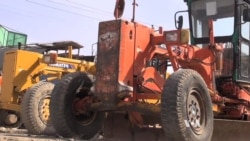Sitting on stackable plastic chairs around a cheap plastic table, drinking Afghan tea in glass mugs, a group of construction workers reminisce about the “golden days” when foreigners were aplenty in Afghanistan.
“It used to be like Dubai before,” Haji Niaz Mohammad, owner of a business that rents out construction machinery, remembers with a wistful look in his eyes. “People from all over the world, from U.S., from Europe, were working here.”
Most of them have now left, taking their millions of dollars with them.
The American-led invasion of Afghanistan in 2001 that forced the Taliban from power was coupled with the influx of billions of dollars into Afghan economy. The U.S. military alone spent almost $1 trillion in Afghanistan on combat missions, and almost $100 billion on development.
Dozens, if not hundreds of international NGOs arrived during this time - often with millions of dollars to be invested in development projects in the war-torn country. Many hired local staff, driving up wages, and creating an economic bubble. The average growth rate for Afghanistan jumped to nine percent from 2003 onwards, rising to above 14 percent in 2012, according to the World Bank.
The withdrawal of foreign forces starting in 2013 has burst this economic bubble. Afghanistan's growth rate fell to two percent in 2014. This year’s outlook looks even worse.
Investor and consumer confidence was further weakened by a protracted political transition and lack of meaningful reform.
Personal impact
Mohammad used to own 40 bulldozers. He could earn as much as $6,000 per month for each of them. Now he is down to 10 and he is happy if he makes even $2,000 each. He is planning to move whatever is left of his once hefty business to neighboring Pakistan.
For the people who work for him, the future is more uncertain. Najibullah from Paktia, who operates one of Mohammad’s bulldozers, worked only six days last month. He has a family of 10 to feed.
The government acknowledges the problems but points to the myriad security and other challenges it inherited. Supporters of President Ashraf Ghani, like Hamidullah Farooqi, former minister of Transport and Civil Aviation, insist that he has shown himself to be “a good partner for the international community” and has received “assurances of continued support.” He also has started tackling the biggest problems, like corruption.
Many locals, however, blame divisions in the unity government for their problems. It took months for President Ghani and Chief Executive Abdullah Abdullah to nominate their cabinet members. On Thursday, Ghani announced his third nominee for the post of defense minister after his first choice was rejected by parliament and the second choice dropped out.
Najibullah complained that the entire focus of the current administration is in the capital, Kabul. Insecurity, he said, is a commonly used excuse to not work on any projects in the provinces but they “don’t do anything even in areas that are peaceful.”
Ghani hopes to change his country’s fortunes by hooking on to China’s plans to build an economic corridor in the region as part of its Silk Route or “Belts and Roads” initiative. He wants Afghanistan to be a bridge between South and Central Asia and exploit the country’s reservoirs of raw materials.
Those plans only have a chance of success if security improves. So far, it has been a bloody year.
Despite a heavy presence of security forces on the streets of Kabul, the city has witnessed several bloody attacks this month alone, including one near the Ministry of Justice and another against the European Union Police Mission in Afghanistan, or EUPOL, near Kabul’s airport.
In the meantime, the country has had a record high poppy crop this year, mostly in the nine most insecure provinces. Many of those areas are under Taliban influence, if not control. The Taliban encourage local farmers to plant the illegal harvest.
The hundreds of millions of dollars they make from drug trafficking has the potential to fuel further violence and insecurity in Afghanistan, which in turn may damage the economy even more.





